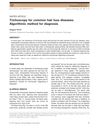 89 citations,
December 2010 in “The Journal of Dermatology”
89 citations,
December 2010 in “The Journal of Dermatology” The conclusion is that an algorithm using trichoscopy helps diagnose different types of hair loss but may need updates and a biopsy if results are unclear.
 34 citations,
October 2012 in “Journal of Dermatology”
34 citations,
October 2012 in “Journal of Dermatology” Growth factors and microneedle therapy increase hair density in women with hair loss.
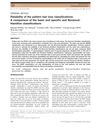 16 citations,
October 2012 in “The Journal of Dermatology”
16 citations,
October 2012 in “The Journal of Dermatology” The BASP classification is more reliable than the Norwood-Hamilton for classifying hair loss in men and women.
 13 citations,
October 2013 in “The Journal of Dermatology”
13 citations,
October 2013 in “The Journal of Dermatology” Cepharanthine may help hair growth by increasing IGF-I in scalp cells.
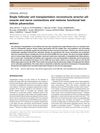 13 citations,
March 2012 in “The Journal of Dermatology”
13 citations,
March 2012 in “The Journal of Dermatology” Hair transplant surgery can rebuild muscle and nerve connections, allowing transplanted hairs to stand up like normal hairs.
 10 citations,
October 2015 in “Journal of Dermatology”
10 citations,
October 2015 in “Journal of Dermatology” Adenosine treatment thickens hair in Caucasian men with hair loss.
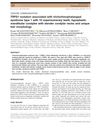 9 citations,
April 2020 in “Journal of dermatology”
9 citations,
April 2020 in “Journal of dermatology” A person with a specific gene mutation had extra teeth, unique jaw and hair features not seen before in this condition.
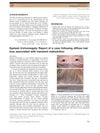 4 citations,
July 2013 in “Journal of dermatology”
4 citations,
July 2013 in “Journal of dermatology” Malnutrition can cause unusual eyelash growth and hair loss.
 August 2019 in “Journal of Dermatology”
August 2019 in “Journal of Dermatology” Woman with diabetes had hair loss due to rare ovarian tumor; surgery improved hair growth.
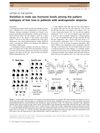 March 2017 in “Journal of Dermatology”
March 2017 in “Journal of Dermatology” Different hair loss patterns may be linked to varying male hormone levels.
 37 citations,
February 2014 in “Journal of Dermatology”
37 citations,
February 2014 in “Journal of Dermatology” Valproic acid increases hair count in men with hair loss.
 36 citations,
June 2018 in “Journal of Dermatology”
36 citations,
June 2018 in “Journal of Dermatology” Use finasteride, dutasteride, and minoxidil for hair loss treatment.
 11 citations,
October 2018 in “The Journal of Dermatology”
11 citations,
October 2018 in “The Journal of Dermatology” Decorin helps keep hair follicle stem cells and may prevent age-related hair loss.
 7 citations,
December 2013 in “The Journal of Dermatology”
7 citations,
December 2013 in “The Journal of Dermatology” A woman's hair turned gray and fell out after starting a cancer drug called imatinib mesylate.
 5 citations,
August 2012 in “Journal of Dermatology”
5 citations,
August 2012 in “Journal of Dermatology” Tamoxifen may cause female hair loss by increasing androgen receptor expression.
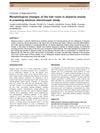 3 citations,
December 2013 in “Journal of Dermatology”
3 citations,
December 2013 in “Journal of Dermatology” Scanning electron microscopy revealed four distinct hair root shapes in alopecia areata, suggesting a less invasive diagnostic method.
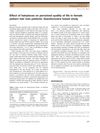 3 citations,
June 2013 in “Journal of Dermatology”
3 citations,
June 2013 in “Journal of Dermatology” Hairpieces improve quality of life for women with hair loss.
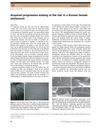 1 citations,
October 2012 in “The Journal of Dermatology”
1 citations,
October 2012 in “The Journal of Dermatology” A Korean girl developed kinky hair without known cause or effective treatment.

Recent discoveries have improved our understanding of hair loss, but challenges in treatment and knowledge among specialists still exist.
 2 citations,
March 2019 in “Journal of Dermatology”
2 citations,
March 2019 in “Journal of Dermatology” Trichoscopy helped diagnose and treat a woman with two different types of hair loss.
 September 2019 in “Journal of Investigative Dermatology”
September 2019 in “Journal of Investigative Dermatology” People with pattern hair loss have higher polyamine levels in the top of their head compared to the back.
 22 citations,
March 2009 in “Journal of Natural Medicines”
22 citations,
March 2009 in “Journal of Natural Medicines” Erica multiflora plant extract can help hair grow by stimulating growth-related cells and triggering hair cycle changes.
 13 citations,
July 2022 in “Frontiers in cell and developmental biology”
13 citations,
July 2022 in “Frontiers in cell and developmental biology” Tiny natural vesicles from cells might help treat hair loss.
 13 citations,
March 2013 in “Dermatologic Surgery”
13 citations,
March 2013 in “Dermatologic Surgery” The document concludes that hair restoration has advanced significantly, with FUE becoming more popular, and stresses the importance of physician training and ethical practices in the field.
 8 citations,
September 2017 in “Journal of Natural Medicines”
8 citations,
September 2017 in “Journal of Natural Medicines” Applying an extract from Perilla frutescens helps hair grow and fights the effects of hair loss hormones.
 6 citations,
January 2017 in “Journal of toxicologic pathology”
6 citations,
January 2017 in “Journal of toxicologic pathology” Rabbit skin with active hair growth shows thicker, redder areas due to larger, more numerous hair follicles and increased blood vessels.
 1 citations,
January 2001 in “Cosmetics and toiletries”
1 citations,
January 2001 in “Cosmetics and toiletries” Procyanidin B-2 from apple juice significantly increases hair growth and may be more effective than minoxidil without side effects.
 September 2016 in “Journal of Dermatological Science”
September 2016 in “Journal of Dermatological Science” Certain factors can start hair growth in adult skin by making cells communicate and form new hair follicles.

The book is a detailed guide on hair growth issues and treatments, recommended for specialists and hospital libraries.
 87 citations,
March 2005 in “Journal of Dermatological Science”
87 citations,
March 2005 in “Journal of Dermatological Science” Asiasari radix extract promotes hair growth and increases protein synthesis and cell proliferation.






























